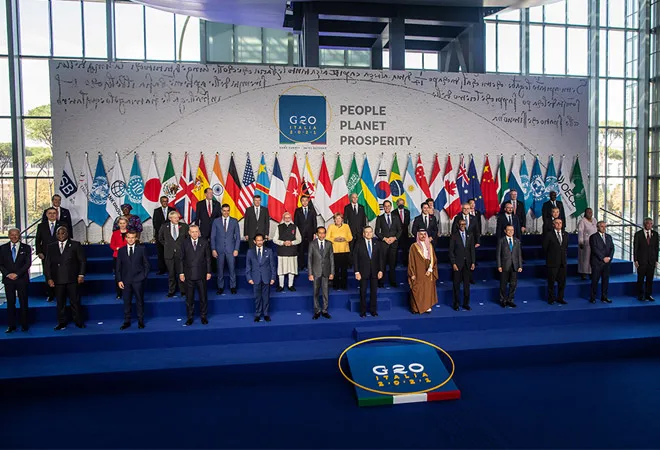
After an eventful year of the G20 led by Italy, the G20 presidency is set to be taken over by Indonesia in 2022 and then India in 2023—two top nations that define emerging Asia. This ‘duplex of Asian G20 presidencies’ led by Indonesia and India takes on a formidable agenda, one that is likely to shape the world economy for the next decade.
The Italian G20 presidency has hosted nearly 175 events in 2021, including 20 ministerial meetings, two special meetings on health and Afghanistan with G20 leaders, 62 meetings of working groups, 60 Finance Track meetings, and several meetings with engagement groups.
On international finance, Indonesia and India will have to develop a ‘flight plan’ that ensures new initiatives on economic recovery, international tax and climate finance are legislated and executed. Indonesia has experience co-chairing Investment and Infrastructure Working Group while India has been co-chairing the Framework Working Group (since inception) responsible for overall guidance on global macroeconomic policies, global financial imbalances, and global economic growth.
Indonesia and India will have to develop a ‘flight plan’ that ensures new initiatives on economic recovery, international tax and climate finance are legislated and executed.
First priority will be to develop the ‘Common Framework for debt treatment beyond the DSSI’ through which the Paris Club and other G20 nations offer systematic management of bilateral and private debt. Its predecessor, the Debt Sustainability Suspension Initiative (DSSI), managed by the International Monetary Fund (IMF) and the World Bank, is set to expire on December 31, 2021.
Since its launch in May 2021, DSSI has seen mixed results. While US $5 billion was offered in relief to nearly 40 low-income countries to respond to the economic stress induced by the pandemic, many countries hesitated in seeking help for fear of declaring their vulnerabilities to the global financial markets. Ethiopia and Chad have already initiated consultations on debt treatment under the new Common Framework.
A second priority will be to enable recycling of the Special Drawing Rights (SDR) US $650 billion issued by the IMF in 2021 towards the low-income nations that desperately need financing for economic recovery. Since SDR’s are allocated by quota of members at the IMF, emerging markets and developing countries have received less than half of the SDRs issued, paradoxically providing less to those who need it most.
IMF itself has suggested that developed nations can recycle their SDRs through the IMF’s Poverty Reduction and Growth Trust (PRGT) which provides interest-free support or through a new Resiliency and Sustainability Trust—both solutions that will have to be evaluated. Experts such as
Daniel Bradlow and Kevin Gallagher have suggested inter-linking all the entities that are currently designated holders of SDRs—central banks, development finance institutions—which will make it easier for nations to transact SDRs themselves.
A third priority will be ensuring that the historic agreement on global tax brokered by the G20 in July 2021 on profit reallocation and global minimum tax is legislated and implemented. Specifically, multinational enterprises with global sales above €20 billion and profitability above 10 percent are expected be covered by the new rules, with 25 percent of profit above the 10 percent threshold to be reallocated to market jurisdictions from where the enterprises are deriving business. This will be complemented by an international minimum effective corporate tax rate of 15 percent on all multinational enterprises with annual revenue over €750 million. At the last OECD meeting on October 8, 2021, 136 countries and jurisdictions representing more than 90 percent of global GDP, including all OECD and G20 countries have agreed to the deal. Estonia, Hungary, and Ireland who were initially opposed to the deal have now joined the agreement.
Since, the multilateral convention on tax is expected to be signed in 2022 and the deal is expected to come into effect in 2023, both Indonesia and India will have a significant part to play in its execution. Indonesia will have to guide the development of the model rules for domestic legislation and the development of the Multilateral Instrument (MLI) for implementation of the Subject to Tax Rule due in 2022. Similarly, India will have to monitor how the agreements are being adopted when the agreement comes into effect. This will require India, as well as other nations
, to withdraw its own digital services tax when the new rules come into effect.
Multinational enterprises with global sales above €20 billion and profitability above 10 percent are expected be covered by the new rules, with 25 percent of profit above the 10 percent threshold to be reallocated to market jurisdictions from where the enterprises are deriving business.
Finally, on the finance track, sustainable finance, regulations on climate finance are going to take centre-stage during the Indonesian and Indian presidency. The G20’s work on climate finance is guided by the Sustainable Finance Working Group—a 2021 upgrade of the Sustainable Finance Study Group established in 2018 and the Green Finance Study Group established in 2016. This year the discussions focused on addressing disparity in disclosure norms, developing taxonomies and rating methodologies, addressing data gaps, and providing a roadmap to international financial institutions for low-carbon pathway—all captured in the G20 Sustainable Finance Roadmap launched this year.
Of most interest to Indonesia and India will be securing finance for green investments. OECD claims that developed countries have committed a total of US $79.6 billion in 2019 but these numbers have been challenged by many developing countries, including India, who has argued, convincingly, that climate finance to the developing world is being gold-plated.
Also of interest to both nations will be the development of internationally consistent, comparable, and reliable baseline standards for disclosure of sustainability-related information on enterprise value creation. IFRS has been tasked with developing these standards based on the FSB-led TCFD framework and preparing the launch of a new International Sustainability Standards Board (ISSB). Also of importance will be the development of new tools for assessing macroeconomic risks of climate change which have implications for global banking and financial regulations, all of which fall within the ambit of the Framework Working Group which India co-chairs.
Unlike the Finance Track agenda of the G20, the Sherpa Track is more scattered and incongruous. Digital economy, global trade, and health are likely to be priority for Indonesia and India.
The digital economy agenda, which was first introduced by Turkey, institutionalised by China and developed by Germany under respective presidencies, will likely be reenergised by Indonesia, which will oversee the newly established Digital Economy Working Group. This will resonate with
Prime Minister Modi’s focus on leveraging technology and digitalisation for development and his call for leveraging ‘data for development’ instead of ‘data as a tool for profit’. Therefore, both Indonesia and India will have the opportunity to table policies on digital public goods, consumer protection, digital trade, and digital governance.
India’s proposal at the WTO for waiver on certain provisions of the TRIPS agreement for COVID vaccines has faced stiff resistance and several counter proposals.
On issues of global trade, G20 has so far fallen short of reforming the WTO, curbing plurilateral rule-making, and waiving Intellectual Property Rights (IPR) provisions from TRIPS for vaccines. India’s proposal at the WTO for waiver on certain provisions of the TRIPS agreement for COVID vaccines has faced stiff resistance and several counter proposals. The reform of the WTO, particularly of the Appellate Body, remains stalled since 2019, when the Trump administration blocked the appointment of judges. The practice of ‘Joint Statement Initiatives’ remains against the spirit of the WTO as it is an attempt by developed countries to insert plurilateral decisions on e-commerce, investment facilitation, and domestic regulations on to the WTO charter without full consensus of all the members continues.
Indonesia has already indicated that it will combine the trade and investment working groups to make it more effective. WTO’s Twelfth Ministerial Conference (MC12), chaired by Kazakhstan, will happen on Indonesia’s watch of the G20 from 30 November to 3 December 2021. Since, the ministerial is held every two years, the next ministerial may coincide with India’s G20 presidency in 2023.
Finally, both Indonesia and India will have the opportunity to lead reforms in global health governance architecture which currently has the World Health Organisation (WHO) at its core. To improve funding of critical global health institutions and initiatives, a new Joint Health and Financing Task force chaired by Italy and Indonesia has already been announced.
India too has welcomed the move, and further indicated that increasing funding for non-earmarked funds at WHO will be a priority.
All indications are that the duplex of Asian G20 presidencies is ready to take on global economic governance agenda. If Indonesia and India succeed, it will lay the course for Brazil and other emerging economic powers to play a more influential role in the global economy.
The views expressed above belong to the author(s). ORF research and analyses now available on Telegram! Click here to access our curated content — blogs, longforms and interviews.



 After an eventful year of the G20 led by Italy, the G20 presidency is set to be taken over by Indonesia in 2022 and then India in 2023—two top nations that define emerging Asia. This ‘duplex of Asian G20 presidencies’ led by Indonesia and India takes on a formidable agenda, one that is likely to shape the world economy for the next decade.
The Italian G20 presidency has hosted nearly 175 events in 2021, including 20 ministerial meetings, two special meetings on health and Afghanistan with G20 leaders, 62 meetings of working groups, 60 Finance Track meetings, and several meetings with engagement groups.
On international finance, Indonesia and India will have to develop a ‘flight plan’ that ensures new initiatives on economic recovery, international tax and climate finance are legislated and executed. Indonesia has experience co-chairing Investment and Infrastructure Working Group while India has been co-chairing the Framework Working Group (since inception) responsible for overall guidance on global macroeconomic policies, global financial imbalances, and global economic growth.
After an eventful year of the G20 led by Italy, the G20 presidency is set to be taken over by Indonesia in 2022 and then India in 2023—two top nations that define emerging Asia. This ‘duplex of Asian G20 presidencies’ led by Indonesia and India takes on a formidable agenda, one that is likely to shape the world economy for the next decade.
The Italian G20 presidency has hosted nearly 175 events in 2021, including 20 ministerial meetings, two special meetings on health and Afghanistan with G20 leaders, 62 meetings of working groups, 60 Finance Track meetings, and several meetings with engagement groups.
On international finance, Indonesia and India will have to develop a ‘flight plan’ that ensures new initiatives on economic recovery, international tax and climate finance are legislated and executed. Indonesia has experience co-chairing Investment and Infrastructure Working Group while India has been co-chairing the Framework Working Group (since inception) responsible for overall guidance on global macroeconomic policies, global financial imbalances, and global economic growth.
 PREV
PREV


